By Joseph L. Gilman, Esq., Associate at SwedelsonGottlieb, Community Association Attorneys
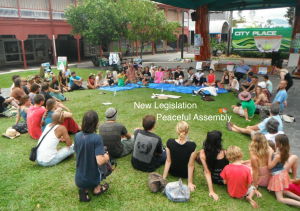 Effective January 1, 2018, Civil Code Section 4515 was added to the Davis-Stirling Act to protect certain rights of political speech and peaceful assembly within the boundaries of a common interest development.
Effective January 1, 2018, Civil Code Section 4515 was added to the Davis-Stirling Act to protect certain rights of political speech and peaceful assembly within the boundaries of a common interest development.
Senator Bob Wieckowski originally presented new Civil Code Section 4515 to California’s legislature as Senate Bill 407. Remarking on his proposed legislation, Senator Wieckowski stated that it “will prevent HOA boards and management from denying basic rights to their residents” as “Boards have fined and threatened legal action against homeowners for simply exercising basic political free speech rights. Millions of Californians live in these associations and SB 407 is needed to prevent these abuses.” While we have no experience with these types of “abuses,” we understand the basis for this new legislation.
As enacted by California’s legislature, Civil Code Section 4515 (which became effective January 1, 2018) protects political speech and assembly rights by invalidating any provision of an association’s governing documents (which includes rules) that prohibits the following:
• Peacefully assembling or meeting, at reasonable hours and in a reasonable manner, for purposes related to common interest development living, association elections, legislation, election to public office, or the initiative, referendum or recall process.
• Inviting public officials, candidates for public office, and representatives of homeowner organizations to meet with members and residents and speak on matters of public interest.
• Canvassing and petitioning the members and residents for purposes related to the topics listed above.
• Distributing or circulating, without prior permission, information about the topics listed above or other issues of concern to the members or residents, at reasonable hours and in a reasonable manner.
Civil Code Section 4515 also invalidates any provision requiring a member or resident to pay a fee, make a deposit, obtain liability insurance, or pay the premium or deductible on the association’s insurance policy, in order to use a common area for any of the meetings described above. Continue reading
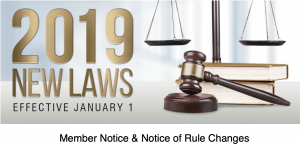
 HOA Law Blog
HOA Law Blog



 A senate bill seeking to prohibit California community associations from establishing qualifications for candidates to run for their boards of directors among other changes and requirements (including possible invasion of owner privacy) is a dumb idea that would create bad law.
A senate bill seeking to prohibit California community associations from establishing qualifications for candidates to run for their boards of directors among other changes and requirements (including possible invasion of owner privacy) is a dumb idea that would create bad law. Effective January 1, 2018, Civil Code Section 4515 was added to the Davis-Stirling Act to protect certain rights of political speech and peaceful assembly within the boundaries of a common interest development.
Effective January 1, 2018, Civil Code Section 4515 was added to the Davis-Stirling Act to protect certain rights of political speech and peaceful assembly within the boundaries of a common interest development. As you may have heard, the Governor signed into law new legislation that now changes a California condominium’s associations ability to prohibit an owner from installing a solar energy system on the common area roof. AB 634, which went into effect on January 1, 2018, amended several provisions of the California Civil Code to set forth language that further clarifies what condominium associations can and cannot do with respect to the installation of an owners own solar energy system on a common area roof and exclusive use common.
As you may have heard, the Governor signed into law new legislation that now changes a California condominium’s associations ability to prohibit an owner from installing a solar energy system on the common area roof. AB 634, which went into effect on January 1, 2018, amended several provisions of the California Civil Code to set forth language that further clarifies what condominium associations can and cannot do with respect to the installation of an owners own solar energy system on a common area roof and exclusive use common. 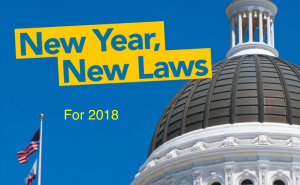 Recent legal Developments affect community association interests in a variety of ways. In 2017, the California Court of Appeal decided several cases concerning such issues as title to common area and board member liability. These cases may be instructive to board members and managers. Meanwhile, on the legislative front, new and pending laws affect association interests in the areas of governance, business dealing, FHA certification, annual notifications and use restrictions. Though not a complete or authoritative guide, we hope this article (published in the Winter 2017 Volume 10, Issue 1 of the Communicator, Community Association Institute/Bay Area/Central California Chapter’s news magazine) can be a useful resource for the most relevant legal updates this year.
Recent legal Developments affect community association interests in a variety of ways. In 2017, the California Court of Appeal decided several cases concerning such issues as title to common area and board member liability. These cases may be instructive to board members and managers. Meanwhile, on the legislative front, new and pending laws affect association interests in the areas of governance, business dealing, FHA certification, annual notifications and use restrictions. Though not a complete or authoritative guide, we hope this article (published in the Winter 2017 Volume 10, Issue 1 of the Communicator, Community Association Institute/Bay Area/Central California Chapter’s news magazine) can be a useful resource for the most relevant legal updates this year.  SwedelsonGottlieb annually updates and publishes its Disclosure and Notice Checklist as a resource for Managers and Board Members of California Community Associations. The updated Checklist is 14 pages (there are a lot of things that California community associations are required to give notice of or disclose) and sets out what disclosures and notices California community associations are to provide to homeowners, when and how they are to be provided, as well as other considerations. Included is information regarding the Code requirements for the Annual Budget Report, the Annual Policy Statement, Fiscal Year End Disclosures, and other Additional Disclosures/Notices. We have included information regarding the recent changes to Civil Code Section 4041 relating to the solicitation of owner mailing addresses, etc. and the required New Management Disclosures.
SwedelsonGottlieb annually updates and publishes its Disclosure and Notice Checklist as a resource for Managers and Board Members of California Community Associations. The updated Checklist is 14 pages (there are a lot of things that California community associations are required to give notice of or disclose) and sets out what disclosures and notices California community associations are to provide to homeowners, when and how they are to be provided, as well as other considerations. Included is information regarding the Code requirements for the Annual Budget Report, the Annual Policy Statement, Fiscal Year End Disclosures, and other Additional Disclosures/Notices. We have included information regarding the recent changes to Civil Code Section 4041 relating to the solicitation of owner mailing addresses, etc. and the required New Management Disclosures. 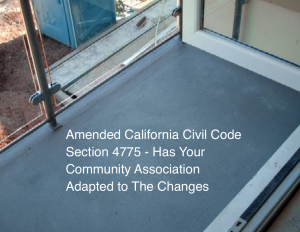 By David C. Swedelson, Community Association Attorney at SwedelsonGottlieb
By David C. Swedelson, Community Association Attorney at SwedelsonGottlieb According to CAI’s California Legislative Action Committee, there is still time to stop AB 634, a bill that impacts a condominium association’s ability to control the placement of solar panels in common interest developments. BUT YOU MUST ACT TODAY BEFORE THE GOVERNOR SIGNS THIS BILL INTO LAW.
According to CAI’s California Legislative Action Committee, there is still time to stop AB 634, a bill that impacts a condominium association’s ability to control the placement of solar panels in common interest developments. BUT YOU MUST ACT TODAY BEFORE THE GOVERNOR SIGNS THIS BILL INTO LAW.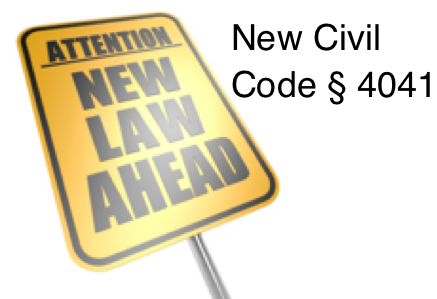 By the Community Association Attorneys at SwedelsonGottlieb.
By the Community Association Attorneys at SwedelsonGottlieb. Since the old Davis-Stirling Act was made into law in 1985, there has been a small debate over whether an owner or their association is responsible for temporary relocation costs incurred when owners in a common interest development are required to vacate their units or homes for common area repairs. Former California Civil Code Section 1364(c) stated that the “costs of temporary relocation during the repair and maintenance of the areas within the responsibility of the association shall be borne by the owner of the separate interest affected.” On its own, this provision seems clear enough; however, because this language was found in the code section that also dealt with termite fumigation, and because it followed the provision dealing with termite fumigation, some owners were confused and debated the issue with their association’s board and management, claiming that unless the relocation was as a result of a treatment for termites, their association had to pay their relocation costs. They were confused and wrong.
Since the old Davis-Stirling Act was made into law in 1985, there has been a small debate over whether an owner or their association is responsible for temporary relocation costs incurred when owners in a common interest development are required to vacate their units or homes for common area repairs. Former California Civil Code Section 1364(c) stated that the “costs of temporary relocation during the repair and maintenance of the areas within the responsibility of the association shall be borne by the owner of the separate interest affected.” On its own, this provision seems clear enough; however, because this language was found in the code section that also dealt with termite fumigation, and because it followed the provision dealing with termite fumigation, some owners were confused and debated the issue with their association’s board and management, claiming that unless the relocation was as a result of a treatment for termites, their association had to pay their relocation costs. They were confused and wrong.